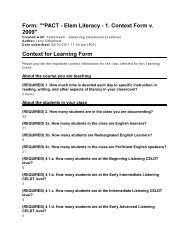The Tutoring Book - California State University, Sacramento
The Tutoring Book - California State University, Sacramento
The Tutoring Book - California State University, Sacramento
You also want an ePaper? Increase the reach of your titles
YUMPU automatically turns print PDFs into web optimized ePapers that Google loves.
“I want my paper to be right. I don’t want to sound stupid; I want to sound intelligent.” His sense<br />
of urgency and overall demeanor told me that he most likely was feeling frustrated and discouraged about<br />
his writing. I began the conversation with,<br />
“Can you tell me what you think the most important issues are that we need to work on today in<br />
your paper?” He focused right in on grammar,<br />
“I need help with my grammar. People can’t understand what I’m trying to say a lot of the time.<br />
My sentences don’t always make sense.” I felt focusing immediately in on the specifics of his paper<br />
would not necessarily encourage him, so I said,<br />
“Well, before we start in on your paper, why don’t you tell me about the paper prompt. <strong>The</strong>n you<br />
can share with me briefly what the primary topic and ideas are in your paper.” He agreed and proceeded<br />
to give me a clear description of the paper prompt and his ideas. He talked and I listened. When he was<br />
done, I shared,<br />
“Your ideas are interesting. I like your focus. You definitely come across as intelligent when you<br />
speak. How about we work to more closely align your verbal communication with your writing. We’ll<br />
look at your paper, make a few changes here and there.” He smiled for the first time in our session. I<br />
knew we were on the right track. Upon review of his paper, I noticed many of his sentences were runons.<br />
He appeared to be trying to include too many ideas or repeating the same ideas within many of his<br />
sentences. His paragraphs lacked clarity and needed to be organized more effectively. He was determined<br />
to focus on grammar. I realized that until he could see the HOC issues in his paper for himself, he<br />
wouldn’t be receptive to my suggestions. I asked him to begin with the first paragraph and read each<br />
sentence aloud. I then followed with directive questions,<br />
What do you think the primary subject is in this sentence?<br />
What is the idea or ideas being expressed?<br />
How does this idea(s) help to support the main idea(s) in your paper?<br />
Does it seem like any words or phrases are being repeated?<br />
How do you think this sentence connects to the sentences that came before this one in the same<br />
paragraph?<br />
Does this paragraph seem to follow a logical progression when you look at the paragraph that came just<br />
before it?<br />
He soon began to see repeated issues within the structure of his sentences, often correcting each sentence<br />
as he read. He started to make bigger connections between ideas within sentences, how those sentences<br />
were organized within paragraphs, and how each paragraph was organized within his paper. <strong>The</strong>orist,<br />
Patrick Hartwell, in his essay “Grammar, Grammars and the Teaching of Grammar,” describes this tutee’s<br />
experience, “Most students, reading their writing aloud, will correct in essence all errors of spelling,<br />
grammar, and, by intonation, punctuation, but usually without noticing that what they read departs from<br />
what they wrote” (366). This tutee did just as Hartwell described. In addition, once he felt his initial<br />
concerns over grammar were addressed, he was able to focus on HOCs. Though we were only able to<br />
cover a portion of his paper, he left that first session encouraged.<br />
<strong>The</strong> above situations are examples of tutoring sessions in which I encountered students who<br />
expressed that grammar issues were their biggest concern in their papers. By focusing in on tutees’ LOCs<br />
(when necessary), instead of ignoring those concerns and attempting to steer them directly to HOCs, we,<br />
as tutors, give tutees agency over their own writing. By viewing each tutoring session on an individual<br />
basis, letting students voice their concerns and applying techniques such as oral reading and readerresponse<br />
methods, open-ended and directive questions, constructive feedback and positive reinforcement,<br />
tutees can overcome their grammar fears and expand their perceptions. <strong>The</strong>y begin to view their papers,<br />
not as separate disconnected parts, but as parts of a cohesive whole. Blending theoretical approaches and<br />
techniques, we can develop specific strategies to meet the individual needs of our tutees. And by<br />
remembering that within the writing center, we are on an equal footing with our tutees, we can act as<br />
24

















